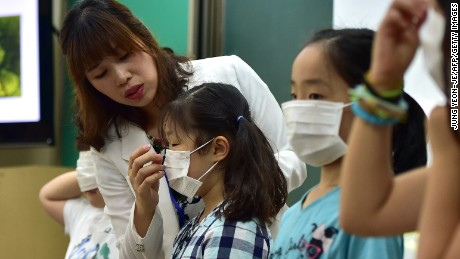The individual is the fifth person ever to be diagnosed with the disease in the country.The patient, who traveled into the UK aboard a Saudi Arabian Airlines flight, was first admitted to a hospital in Leeds before being transferred to the Royal Liverpool Hospital in Liverpool, which specializes in respiratory infectious diseases. The patient iscurrently stable and receiving the necessary treatment. "The patient is thought to have contracted the infection whilst in the Middle East before traveling to the UK," said Dr. Jenny Harries, deputy medical director at PHE. "Public Health England is following up those who have had close and sustained contact with the patient to offer advice and to monitor them as necessary."
What is MERS?
MERS is a viral respiratory illness brought on by the Middle East respiratory syndrome coronavirus (MERS-CoV). It is in the same family of viruses as severe acute respiratory syndrome (SARS), as well as the common cold.Symptoms include shortness of breath, fever, cough, kidney failure and gastrointestinal issues, however not all of those infected with the illnesses are symptomatic.Researchers don't yet know its exact mode of transmission, but the illness — first reported in Saudi Arabia in 2012 — generally spreads through close contact with people who are ill. It is thought to spread through respiratory secretions, such as coughing. Because little is known about the epidemiology of the disease, for example how people are infected and how it spreads, treating the illness can be complicated, according to Jimmy Whitworth, professor of international public health at the London School of Hygiene and Tropical Medicine International Public Health. "MERS-CoV is a disease we worry about because we don't have any specific countermeasures to it. We've got no specific drugs, no specific vaccine, or anything to deal with it," said Whitworth."Essentially we need to identify cases, get them into isolation and to give them intensive supportive care until they get better."The virus was possibly first transmitted from an animal to a human, as a 2014 study showed that three-quarters of camels in Saudi Arabia tested positive for past MERS exposure. It's believed that the disease originated in bats and was then passed on to camels, according to WHO. Since September 2012 — when the first case was detected in humans — there have been 2,229 other laboratory-confirmed cases of infection with MERS-CoV, according to WHO, which resulted in the deaths of 791 people, around 35% of reported patients.The illness has been detected in 27 countries, including the UK, the United States, Turkey, Thailand and China among others. Around 80% of cases have been detected in Saudi Arabia. Nonetheless, human-to-human transmission of the virus is difficult. "It is important to emphasize that although a case has been identified, the overall risk of disease transmission to the public is very low," said Harries.PHE is currently contacting people who might have had close contact with the infected individual in order to monitor symptoms. This includes a number of passengers who traveled on the same flight as the patient."As we've seen in previous cases, we have well-established and robust infection control procedures for dealing with cases of imported infectious disease and these will be strictly followed to minimize the risk of transmission," said Harries.
"MERS-CoV is a disease we worry about because we don't have any specific countermeasures to it. We've got no specific drugs, no specific vaccine, or anything to deal with it," said Whitworth."Essentially we need to identify cases, get them into isolation and to give them intensive supportive care until they get better."The virus was possibly first transmitted from an animal to a human, as a 2014 study showed that three-quarters of camels in Saudi Arabia tested positive for past MERS exposure. It's believed that the disease originated in bats and was then passed on to camels, according to WHO. Since September 2012 — when the first case was detected in humans — there have been 2,229 other laboratory-confirmed cases of infection with MERS-CoV, according to WHO, which resulted in the deaths of 791 people, around 35% of reported patients.The illness has been detected in 27 countries, including the UK, the United States, Turkey, Thailand and China among others. Around 80% of cases have been detected in Saudi Arabia. Nonetheless, human-to-human transmission of the virus is difficult. "It is important to emphasize that although a case has been identified, the overall risk of disease transmission to the public is very low," said Harries.PHE is currently contacting people who might have had close contact with the infected individual in order to monitor symptoms. This includes a number of passengers who traveled on the same flight as the patient."As we've seen in previous cases, we have well-established and robust infection control procedures for dealing with cases of imported infectious disease and these will be strictly followed to minimize the risk of transmission," said Harries.
Past outbreak in South Korea
In 2015, an outbreak of MERS in South Korea infected 86 people, leaving 36 of them dead as a result of the illness. The outbreak also resulted in the quarantine of thousands. However, much of why the disease was able to infect so many people was because of poor communication between hospitals and hospital staff, allowing the initial carrier of the illness to visit multiple health facilities in South Korea exposing others to the disease before the patient was ultimately diagnosed. MERS still isn't entirely understood, but there are now clear guidelines around how to handle the disease, said Whitworth.
Original Article
[contf] [contfnew]






